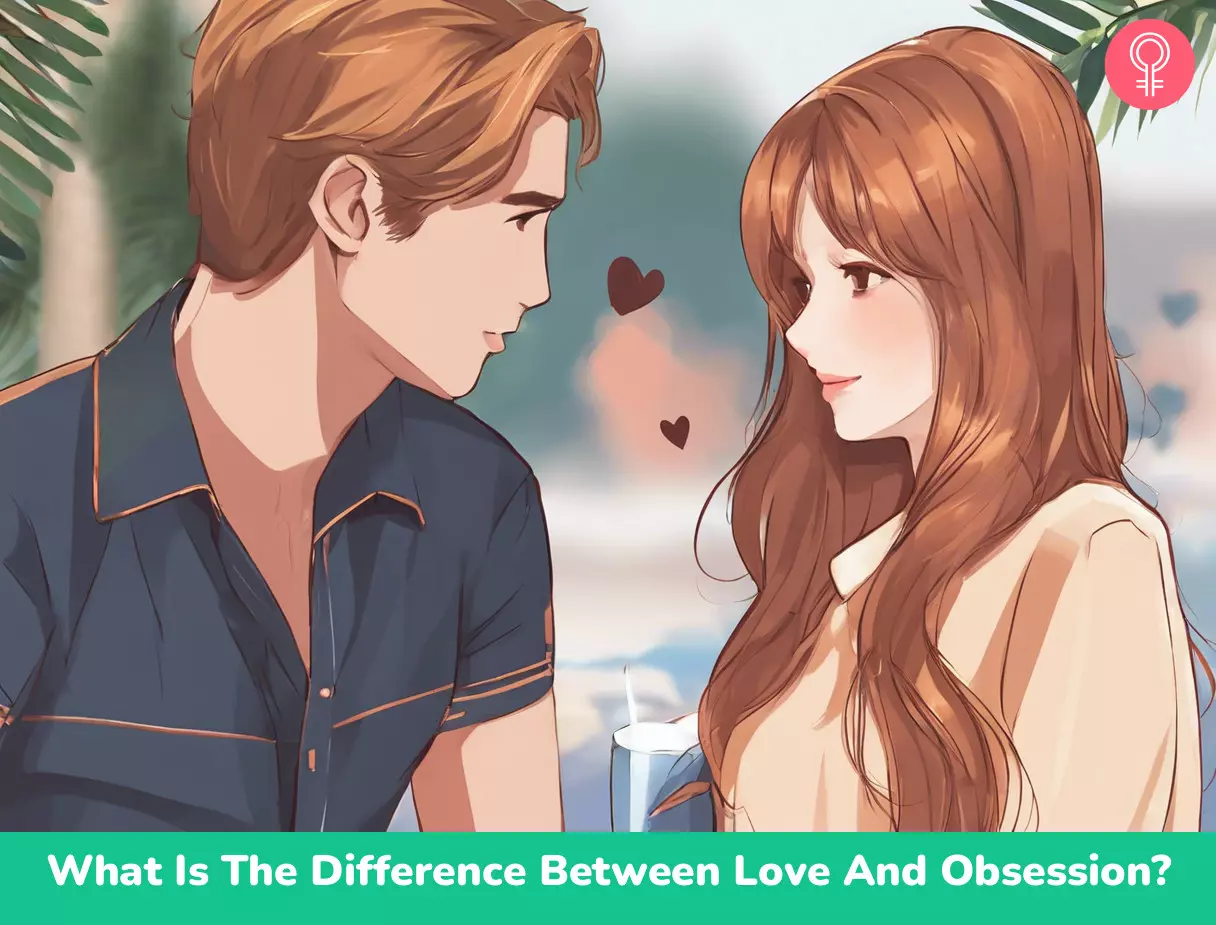Love Vs. Obsession What Are The Differences?
Knowing how they differ can help you make the right choice and get the help you need.

Image: Shutterstock
We all need a real loving, caring, and committed person in our lives.
But do you know there is a fine line between the heat of love and the fire of obsession? If you are in true love, your partner will always want you to be happy and give the best, whereas if there is an obsession, you may feel insecure, and your partner cannot think affectionately. As per studies, obsessive love is a mental issue that needs treatment (1). You may feel suffocated and trapped in your relationship when your partner is just obsessed and wants to control you at every step. This article explores the facts and differences between love and obsession. Scroll down for more information.

In This Article
Love Vs. Obsession
Love is a healthy emotion that enables the two people involved in the relationship to grow in life and appreciate each other’s differences with equal ardor. On the contrary, obsession is an unhealthy sentiment where the obsessive partner does not allow the other person to grow and pursue their interests. They always feel insecure about their partner and experience jealousy and paranoia.
An obsessive person is likely to spend excessive time thinking about their partner and trying to please them. They exhibit an intensity of possessiveness that is extreme and often objectify their significant other. Obsessive partners are controlling and demanding and can even become abusive over time.
It is also helpful to explore the difference between love and in love, as these are distinct experiences. While being in love is often associated with intense emotions and passion, love itself is deeper and more enduring, characterized by commitment and understanding.
Love can turn into obsession due to excessive attachment, low self-esteem, and mental health conditions (2). When someone is “obsessed in love,” it means they are consumed by their feelings for a particular person, to the point where it may be unhealthy or detrimental to their well-being. So, if you think your partner is obsessive about you or leaning towards obsessive behavior, it is time to take appropriate action.
Given below are some traits generally observed in obsessive partners.
Key Takeaways
- In love, partners feel free to be themselves within a safe and secure container, whereas obsessive love can feel suffocating and toxic.
- Obsessive love manifests as stalking, controlling behavior, excessive clinginess, objectification and possessiveness.
- Obsessive love can be likened to a mental disorder and needs to be treated as it can be detrimental to the health and wellbeing of not only the relationship but also the individuals in it.
Symptoms Of Obsessive Love Disorder
1. They Constantly Make You Feel Special

If you are in love, you will invest time and effort with enthusiasm to make your partner feel special. However, when it turns into obsession, the partner will constantly pamper their significant other to keep them hooked in the relationship. They may bomb you with gifts now and then, shower adoration, write poems for you, and do other things constantly to woo you.
For example, let’s say your partner showers you with extravagant gifts, over-the-top compliments, and constant attention, even when you haven’t asked for it. At first, it feels flattering, but soon, their excessive adoration starts to feel overwhelming. If you ever express the need for space, they guilt-trip you, saying things like, “After everything I do for you, how can you push me away?” Over time, their relentless need to keep you captivated feels less like love and more like a way to keep you emotionally tied to them.
2. They Show Extreme Possessiveness
The difference between love and obsession can be measured by the extent of your partner’s possessiveness.
In love, a little possessiveness is natural. But obsessive love does not work that way. An obsessive partner will show over-possessiveness and constantly feel scared of losing you to someone else. Their possessiveness can grow to an extent where you may feel smothered in your relationship.
If you find yourself with a partner struggling with controlling tendencies, you can suggest practical ways to stop being possessive. Possessiveness often stems from insecurity and fear of loss, it is important to alleviate these feelings and strengthen your bond.
Say your partner becomes upset whenever you interact with others, even in casual or professional settings. They question your friendships, insist on knowing who you are texting, and get jealous if someone simply compliments you. No matter how many times you reassure them, it’s never enough. They always suspect there is more to the story. Over time, their extreme possessiveness makes you feel like you have to walk on eggshells.
Epiphany, a blogger, vividly recounts her experience of dating a jealous and possessive man, saying, “He had expectations of me as his girlfriend that felt suffocating. He wanted to be the only man in my world — my lover, my best friend, my handyman, mechanic, plumber (did he know anything about plumbing? Nope, but god forbid another man enter my house) (i).” His desire to control reflects a level of possessiveness that is unhealthy and toxic.
3. They Will Be Extremely Clingy

It feels great when your partner tries to know about your whereabouts when you are not with them. But what if they irk you by sending a barrage of messages every time? Their constant longing to be around you is a sign of unhealthy obsession and addiction, and not love. Being aware of the signs that indicate someone is needy in a relationship is important. Excessive neediness can strain the relationship, leading to feelings of suffocation and emotional exhaustion.
For example, let’s say your partner constantly texts and calls you throughout the day, expecting immediate responses. If you take too long to reply, they assume something is wrong or accuse you of ignoring them. Even when you are spending time with friends or focusing on personal tasks, they insist on being included or demand reassurance of your love. Over time, their overwhelming need for attention makes you feel drained, as if you can never have a moment to yourself without upsetting them.
4. They Are Very Controlling
An obsessive partner may exhibit a controlling nature. They will act as the sole decision-maker in the relationship. Obsessive lovers are also very demanding and will want you to fulfill their every small need.
For example, your partner starts making decisions for you, choosing what you wear, who you spend time with, and even how you spend your free time. If you express a different preference, they insist their way is better or guilt-trip you into agreeing. They expect you to prioritize their needs over everything else, getting upset if you don’t immediately comply. Over time, their control over your choices leaves you feeling powerless.
5. They Will Keep Track Of Your Online And Offline Behaviors

It should not be surprising if your obsessive partner often pays you surprise visits at your office or when you are with your friends. They may stalk you on social media and get infuriated when you talk to someone else or like their pictures or posts. In other words, obsessive lovers constantly monitor the actions of their partners.
Take this for example, let us say your partner frequently checks your social media activity, questioning why you liked a friend’s post or commented on someone’s picture. They unexpectedly show up at your workplace or social gatherings, claiming they “just wanted to see you.” If you don’t respond to their texts right away, they bombard you with messages or demand to know where you are. Over time, their constant surveillance makes you feel like you have no privacy, turning love into a suffocating experience.
 Quick Tip
Quick Tip6. They Ignore Others Because Of You
No matter how busy someone gets in life, they will always take time from their schedule to talk to or meet their loved ones. However, it is a different ball game altogether with an obsessive partner, where it manifests as intense devotion.
Obsessive lovers ignore their family and friends and show an emotional fixation with you. They find it difficult to maintain other relationships due to their obsessive preoccupation. Even if they are with their family or friends, they will constantly keep a check on you. They might even object when you choose to be with anyone, even your loved ones and family, over them, making you feel uneasy with the compulsion.
For example, let’s say your partner starts canceling plans with friends and distancing themselves from family. They are insisting that you are the only person they need. Even when they do spend time with others, they constantly text or call you, making it clear their focus is still on you. If you encourage them to maintain their other relationships, they dismiss it, saying, “You are all that matters.” Over time, their world shrinks to just you, making you feel pressured to fill every role in their life.
7. They Will Rush In A Relationship

When two people love each other, they want to give their relationship some time and let it flow at its pace rather than pushing things. On the other hand, an obsessive lover will always hurry to make the relationship official even if you aren’t there yet out of the constant fear of losing you.
For instance, let us say you have just started dating someone, and after only a few weeks, they are already talking about moving in together or planning a future as if you have been together for years. When you express the need to take things slow, they become upset, saying, “Why wait when we know we are meant to be?” Their urgency feels overwhelming, making you question whether the relationship is based on love or their fear of being alone.
8. They Will Not Give Genuine Opinions
Sharing opinions by speaking one’s mind is a part of healthy love. When love turns into a mania, people tend to hide their true feelings and only say things that make their partner happy. Sugar coating becomes natural for them. As a result, they become unreal rather than honest.
Say your partner always agrees with you, no matter what you say. If you ask for their opinion on an important decision, they simply tell you what they think you want to hear instead of being honest. Even when something bothers them, they avoid bringing it up, fearing it might upset you. Over time, their lack of genuine input creates a false sense of harmony.
9. They Will Abuse You

A healthy romantic relationship has no place for abuse – be it verbal or physical. Even in case of arguments or disagreements, a couple will not force or inflict their opinions on each other. However, obsessive partners will not take objections. They will try to indoctrinate your mind with the ideas they believe in. Obsessive lovers can also become abusive with their partners and physically harm their partners.
For example, your partner gets upset when you disagree with them on something minor. Instead of having a conversation, they lash out, raising their voice, insulting you, or even grabbing your arm to make you listen. If you try to walk away, they block your path or threaten to leave you if you don’t comply. Over time, their words and actions make you feel trapped, as if expressing your own thoughts will only lead to more pain.
 Quick Tip
Quick Tip10. They Will Use Guilt To Manipulate
Obsessive partners can manipulate their significant others, making them feel bad or guilty about calling them out or trying to establish boundaries. Such partners try to blame their partners, claiming they are the reason for such obsessiveness. Usually, the fear of abandonment compels the obsessive partners to behave in such a way. They leave their lovers feeling sad and confused.
For example, let us say your partner constantly checks in on you, questioning your whereabouts and who you are with. When you express discomfort and set boundaries, they respond with, “If you really loved me, you wouldn’t push me away,” or, “I wouldn’t act this way if you didn’t make me feel so insecure.” Instead of taking responsibility, they shift the blame onto you, making you feel guilty for wanting space. Over time, this emotional weight leaves you feeling conflicted, unsure whether you are the one at fault or simply trying to maintain your independence.
Other Symptoms
- Overwhelming attraction
- Extreme jealousy
- Low self-esteem
- Dire need of reassurance
Causes Of Obsessive Love Disorder
Identifying the psychological roots of obsession can help partners recognize their unhealthy behaviors towards their partners. Past traumas and poor relations with parents can deeply influence someone’s way of loving their partner. We have listed some common reasons for obsessive love disorder.
- Overwhelming attraction
- Extreme jealousy
- Low self-esteem
- Dire need of reassurance
Obsessive love disorder goes hand-in-hand with certain mental health conditions.

- Delusional Jealousy: It is characterized by believing something that is not true according to your partner (3).
- Obsessional Jealousy: This is a constant fear that your partner is betraying or cheating on you (4).
- Attachment Disorders: These result from emotional attachment issues during childhood, such as obsession, abandonment, or lack of empathy (5).
- Erotomania: This mental condition is a subtype of delusional disorder and involves the idea that someone might be in love with you even if you do not know them (6).
- Borderline Personality Disorder: It is characterized by self-image issues, mood swings, and fear of abandonment (7).
- Obsessive-Compulsive Disorder: This disorder is characterized by obsessive behavior and uncontrollable thoughts (8).
Obsessive love can be treated in several ways, including both psychotherapy and practical solutions. However, if the sufferer starts exhibiting abusive or dangerous behavior, safety measures or police intervention may be required. Here are some ways to deal with obsessive love disorder.
How To Overcome Obsessive Love Disorder

- Medications
Underlying mental conditions may often trigger obsessive behaviors. In such cases, the doctor may recommend antipsychotics, antidepressants, anti-anxiety medications, or mood stabilizers to address the underlying issues.
- Therapy
If the affected person is committed to their partner, they may require psychotherapy to control the fervency of the infatuation. This solution is quite helpful and might require the involvement of family members, especially if childhood issues have contributed to the disorder. The treatment may involve talk therapy, dialectical behavioral therapy, and cognitive-behavioral therapy.
Seeking the help of a licensed mental health professional is the best resort in some instances. They will diagnose the root cause of the problem and take the best course of action to help you heal. Counseling usually involves working on the patient’s self-esteem, individual ideals, and other interpersonal problems.
- Counseling
Seeking the help of a relationship coach is the best resort in certain cases. A relationship adviser will diagnose the root cause of the problem and take the best course of action to help you heal. Counseling usually involves working on the patient’s self-esteem, individual ideals, and other interpersonal problems.
- Self-Help
Try to make your relationship healthy by giving your significant other some space. You also need to control your obsessive thoughts to prevent your relationship from getting ruined. Instead of constantly thinking of your partner, involve yourself in other tasks, especially your professional work. You can also try some self-help methods, like engaging in some intense physical activities to release stress. Further, putting your obsessive thoughts into words is a great way to reflect on them better, so start journaling. Lastly, practice meditation to develop mindfulness and gradually reduce obsessive thoughts.
You can take up an interesting hobby and pursue things you love. Try to shift your passion and concentration to another activity you have always wanted to do. Surround yourself with your friends and family and take care of them. This way, you will be able to keep your mind off your partner. You can also take a break from your relationship by parting ways with your partner for the time being.
Overcoming obsessive love isn’t enough. You must also make an effort to ensure your love stays healthy and true. Here’s how you can do it. Keep reading.
How To Ensure Your Love Stays Healthy

A strong relationship isn’t just about love, it’s about how well you nurture it. Healthy love thrives on effort and balance. Whether you are just starting out or have been together for years, these steps will help you build a relationship that is fulfilling, supportive, and long-lasting. Read on!
1. Build A Culture Of Honest Communication
The way you communicate shapes the strength of your bond. Instead of bottling up feelings or assuming your partner knows what you need, make honesty a habit. Share your thoughts openly, even when discussing difficult topics. Listening is just as important. So, pay attention, ask questions, and make sure your partner feels heard. A relationship where both people feel safe to express themselves builds deeper connections.
2. Protect Your Individuality
Love should enhance who you are, not consume your identity. A healthy relationship allows both partners to maintain their own interests and personal goals. When you continue growing as a person, you bring fresh energy and perspectives into the relationship. Instead of trying to complete each other, focus on complementing each other’s growth.
3. Make Affection And Appreciation A Daily Habit
Love isn’t just about big romantic gestures, it’s about showing up every day in small but meaningful ways. Express gratitude and show affection. A simple, “I appreciate you” or an unexpected hug can reinforce emotional security and remind your partner they are valued. The more you nurture love, the more it flourishes.
4. Learn How To Disagree Without Damaging The Relationship
Arguments are inevitable, but they don’t have to weaken your bond. Instead of proving who is right, focus on understanding each other’s perspectives. Avoid insults, yelling, or bringing up past mistakes. Instead, take a step back, breathe, and approach conflict with patience. The goal is not to “win” an argument but to strengthen your connection.
5. Keep The Relationship Exciting
Love thrives on new experiences. Over time, routines can make a relationship feel predictable, but small efforts can keep the spark alive. Try new activities together, surprise each other with little gestures, or revisit places that hold special meaning for your relationship.
Healthy love isn’t about perfection, it’s about being intentional with your words, actions, and the energy you bring into your relationship. By prioritizing companionship you can create a love that grows stronger with time.
Infographic: Top 6 Signs Of Obsessive Love Disorder
Obsessive love disorder is often confused with genuine love and affection. Individuals with this disorder are very possessive and don’t respect boundaries and personal space, causing havoc in their relationships. Hence, if you want to protect yourself and those around you, it is important to identify these signs promptly. Check out the infographic below to know what they are.
Some thing wrong with infographic shortcode. please verify shortcode syntaxThere is a key difference between the two when it comes to love vs. obsession. Love makes you happy and allows both partners to flourish in life. Obsession, on the other hand, can make you feel insecure. The symptoms of obsessive love disorder include extreme possessiveness, clinginess, and extreme jealousy. It may also be a sign of an underlying mental health condition that may cause obsessiveness in you or your partner. In such a situation, you or your partner should seek the help of a professional therapist for counseling and medication.
Frequently Asked Questions
Can love become an obsession over time?
Yes. When the attachment between partners intensifies, the love can transform into obsession gradually. Factors such as fear of breakup, excessive dependency, and deep insecurities can develop possessiveness and an uncontrollable need for closeness.
What are the first signs of obsessive love?
The first signs of obsessive love are intense fixation on the partner and a continual need for reassurance. Individuals can also show possessive qualities like monitoring their partners’ online and offline activities and keeping tabs on all their connections.
Does obsession last forever?
There is no exact timeline for this. In some cases, obsession may last for years without proper diagnosis or treatment. That is why it is important that the individual seeks professional treatment to help them manage this issue.
Why do I obsess over someone who doesn’t want me?
Romantic rejections can motivate an individual to become more obsessed. This will push them to try to find every detail about the other person in the hope the outcome will be different this time.
Is it possible to move from obsession to love in a relationship?
Yes, it is possible to move from obsession to love in a relationship. Individuals need to address the underlying issues that are fueling their obsessive behavior. This often requires therapy, self-reflection, and communication with their partner.
Is it possible to love someone without being obsessed with them?
Yes. Loving someone without being obsessed means valuing their individuality, allowing them to have their own interests, and giving them space to grow and develop as a person. It means being supportive and caring without being controlling and trusting them to make their own decisions.
How can you maintain a healthy balance between love and obsession in a relationship?
Having open communication, setting boundaries with your partner, prioritizing your personal growth, engaging in hobbies, spending time with friends and family, and taking time for yourself will help maintain a healthy balance between love and obsession.
Can love be one-sided, or is that a form of obsession?
Love can be one-sided and is not always a sign of obsession. When one person develops romantic feelings for another who does not share those feelings, it is one-sided love. Although painful and challenging to navigate, it is not always obsessive. One-sided love is merely love that is not reciprocated. However, obsession generally entails possessive and controlling behavior.
How do social media and technology affect the line between love and obsession?
Social media and technology provide additional avenues for monitoring, manipulating, and obsessing over a partner. With the ability to constantly track a partner’s online activity, it can become easy to be consumed with thoughts of them and engage in controlling behaviors.
Illustration: What Is The Difference Between Love And Obsession?

Image: Stable Diffusion/StyleCraze Design Team
Distinguish between love and obsession with five key differences. Understand the complexities of intense infatuation by watching the following video.
Personal Experience: Source
StyleCraze's articles are interwoven with authentic personal narratives that provide depth and resonance to our content. Below are the sources of the personal accounts referenced in this article.
(i) What I Learned From Dating a Jealous, Insecure, Possessive Manhttps://medium.com/illumination/what-i-learned-from-dating-a-jealous-insecure-possessive-man-2429f878e0af
References
Articles on StyleCraze are backed by verified information from peer-reviewed and academic research papers, reputed organizations, research institutions, and medical associations to ensure accuracy and relevance. Read our editorial policy to learn more.
Articles on StyleCraze are backed by verified information from peer-reviewed and academic research papers, reputed organizations, research institutions, and medical associations to ensure accuracy and relevance. Read our editorial policy to learn more.
- Relationship Obsessive–Compulsive Disorder
https://pmc.ncbi.nlm.nih.gov/articles/PMC4834420/ - Love Addiction, Adult Attachment Patterns and Self-Esteem
https://pmc.ncbi.nlm.nih.gov/articles/PMC9964255/ - Intention, false beliefs, and delusional jealousy
https://pmc.ncbi.nlm.nih.gov/articles/PMC3524690/ - Obsessive versus delusional jealousy
https://pubmed.ncbi.nlm.nih.gov/24048408/ - Understanding of attachment difficulties
https://www.ncbi.nlm.nih.gov/books/NBK588783/ - Erotomania : epidemiology and management
https://pubmed.ncbi.nlm.nih.gov/16097848/ - Borderline Personality Disorder
https://www.ncbi.nlm.nih.gov/books/NBK430883/ - Obsessive-Compulsive Disorder
https://www.ncbi.nlm.nih.gov/books/NBK553162/
Read full bio of Michele Waldron
Read full bio of Sneha Tete
Read full bio of Subhrojyoti Mukherjee
Read full bio of Gazala Firdos Ansari



























Community Experiences
Join the conversation and become a part of our empowering community! Share your stories, experiences, and insights to connect with other beauty, lifestyle, and health enthusiasts.